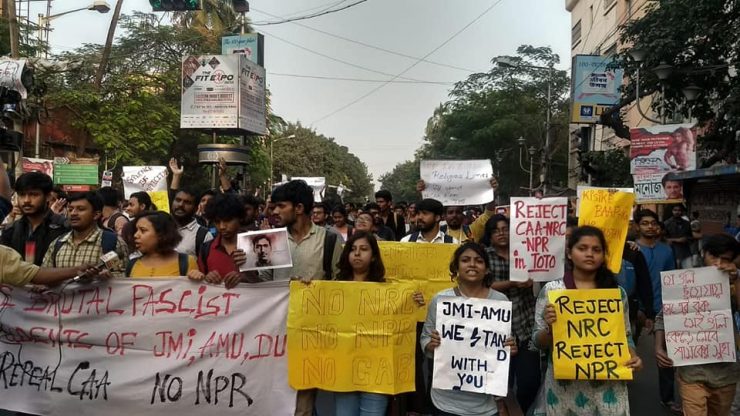1.
A week before the Hindutva-sponsored anti-Muslim pogrom in northeast Delhi, I was talking in class to my students about their going to these neighbourhoods to document the Shaheen Bagh style protests that were taking place in almost all of these locations. I wrote some of those names on the blackboard – Mustafabad, Noor Ilahi, Sundar Nagari, Chand Bagh, Khajuri. I ask my students, if they have been to any of those places. None of them has. I ask them, if they have heard of any of these places. None of them has. I ask them, if they have heard of a place called Khan Market. They giggle – nervously. Of course they have.
I teach in one of India’s most expensive new style liberal arts colleges. It is not my students’ fault they are not familiar with the names of these mostly working class, mostly Muslim neighborhoods. The ones that are now burning. Invariably, everything comes down to geography. You can’t expect the rich and the poor to live side by side. Even if they do, they do as servants and masters. Never as equals. There is a long and complex association between being poor and being Muslim in India. There is an even longer and far more complex relationship between being Hindu and being Muslim in India. A relationship that exceeds class, but never quite lets go of class. The pogrom bought these neighbourhoods into the privileged’s map of Delhi. And, it did so as “bad news.” A kind of visibility that was uncalled for.
A fascist redraws the maps of a nation. As we have seen in this country again and again. Re-draws it, re-interprets it, gives the map new meanings. In this, fucked up as it sounds, a fascist is an artist, a poet. The truth is, being an artist or a poet has not prevented anyone from being a fascist.
On day 2 of the Delhi riots, I go to Khan Market in the afternoon. I stay there exactly for 20 minutes. A morbid curiosity takes me there. A perverse curiosity, one can say too. Yes, in order to be a poet worth any salt, you need to be perverse. You need to have the eye to see the bad, the evil in everyone. And, you need to do it quickly. I am invested in recording the evil. I take pride in the fact that I am a habitual fault-finder.
So, at Khan Market, I take turns to visit each of the “cool” cafes. Beautiful people are sipping on beautiful coffee from beautiful handmade cups. Beautiful women with beautiful skin, beautiful hair, beautiful earrings dangling from their ears. The Delhi liberatti. I am sure some of them are talking about the riots. Maybe. Maybe not.
I don’t sit anywhere. Friends are trapped inside neighbourhoods in northeast Delhi. A voice of a teenager trapped on my WhatsApp: “Mustafabad mein jo protest hain na, unki pichhe ki saari Hindu galio mein mahila tak lathi leke khade hain.” A few minutes later, another one: “mustafabad ke Pulia ke ulte side pathar baazi shuru huyi hain.” A few minutes later, yet another one: “They are saying they will burn down the mosque. Please help us.”
I am trying to write. No, not a poem. A report on what is going on. A report for Groundxero (www.groundxero.in). I have not been trained as a journalist. I do not know how to translate desperate cries for help, for life into a coherent account of what is going on. But, I am supposed to be a poet. And, isn’t this what the poets do? Write through fragment, write through broken images? Yet, how does one write the fear of death into any recognizable genre? One can’t. But, it has to be. Glorifying silence cannot be the work of a poet. To indulge, to wallow in silence cannot be the work of a poet. It is also true, I have not written anything that resembles a poem in ages. I write. I write a lot. I write reports, political essays, pamphlets. And, I don’t regret any of it at all. Sometimes, writing a pamphlet seems like the most potent form of homecoming.
3.
I am reading account after account of violence. Violence on Muslim neighbourhoods, places of worship, men, women and children. I am watching video after video. I cry, I throw things on the floor. In the language of the Facebook, “my mental health has been affected.” One of the biggest assaults that neoliberalism has perpetrated in our everyday lives, is the assault on language. The way it has thrust upon us a language that survives on trivializing every possible human relationship. Along with making a spectacle out of everything.
Like that moment when I am chatting with two of my friends – a Kashmiri Muslim man and a Bengali, Hindu, upper-caste woman. Just like myself. They are much, much younger than me, and closer in age to each other than I am to either one of them. Politically, we believe in similar things. At least, in terms of what we say to each other, what we pose as in public. We are in the middle of a friendly banter, when our Kashmiri friend admits, in spite of being a somewhat privileged, educated young man, he, too, has been humiliated multiple times by the army in the streets of Kashmir.
In some ways, there is nothing exceptional about his story. In a very eerie kind of a way, this is what one has to always keep in mind when befriending a Kashmiri. What he/she is living with, you do not know. How the story of what he/she is living with will come out in the open, you do not know. How what has come out, will affect the space that you share with your friend, you do not know. You cannot know. The fact that you are an Indian, makes it even more complicated. Because, everything that has been done in Kashmir so far, has been done in your name. Whatever you do in return, as an individual or as part of a civil group, will always be profoundly and overwhelmingly inadequate. This inadequacy will be felt at every step of the friendship that you develop with a Kashmiri Muslim man or woman. And, this is what occupations do. They change the nature of the relationship one human being can share with another. Just like patriarchy. Just like caste. Just like class. Just like any form of religious or communal supremacy.
In our case, the most honest thing to say would be, when our Kashmiri friend began to talk about his humiliation, we did not know what to do. I did not know what to do. Because, for most of us who have grown up in middle-class mainland India, it is difficult to imagine the human cost of the militarized everyday in Kashmir. And, if we are honest with ourselves, our interactions should reflect this awkwardness. This not knowing of what to do. Yet, our other friend – the Bengali, Hindu woman – contorts her face into an affected expression, says, “I am sorry.” That was a moment when I could have slapped her. But, didn’t. Because I am older now. Twenty years ago, I wouldn’t have been able to exercise such restraint. And, wouldn’t have – without any regret or remorse.
Yet, my desire to commit this violence bothers me. What is it about that simple sentence – I am sorry – an apology, that bothers me so much? Apologies, when uttered sincerely, signal a new beginning. We all know that. Then? Why am I bothered so much by this apology? I am, because in this case, this sentence uttered so casually, is an assault on language. It is an assault on the notion of profoundity, or the very possibility of it, that language opens us up to. It is an assault on the notion that sometimes the profoundest of the apologies are best left unuttered. It is an assault on the notion that in most human situations that demand our brushing into the unthinkable, the sincerest of the apologies are uttered in ways that do not require us to utter those three simple – way too simplistic – words. I am sorry.
Apologies, then, are rendered through glances, looks, a touch on the wrist, a hug, a kidd. And, actual engagement with what is being said, what is being described. But, in this instance, no such thing happened. The apology was rendered from a place of political correctness – the other vicious gift of the neoliberal era. The apology was uttered from, I repeat, a place of political correctness that does not dare to tread into political consciousness. The apology was meant to shake off responsibility, rather than to embrace it. And, this shaking off of one’s responsibility, of one’s culpability, of one’s implication – dare I say it – is way too American? That nation which resides in every single middle-class Indian’s heart and mind as the embodied allegory of neoliberalism. Yet, we are blissfully unaware of it. And, choose to be so. Within this field of increasing neoliberalization/Americanization of both our cultural worlds and political activism, even of the most radical kind, every apology, every emotion has to be vocalized, without quite meaning it, or recognizing its implications, thus trivializing the emotion, of course, but also the language in which things are spelt out.
As a poet, trivialization of language is what I dread. To be honest, the word “mental illness” does not adequately describe what I feel. There is no quick fix or cure to political despair. No therapist in this planet can cure a “patient” of such a disease. And, there is an even bigger form of political despair that one faces in front of a mob hysteria, especially one that has been inspired by a religious fascism. What good is a poem in front of a mob of lathi-wielding Hindutva-inspired goons? What good is the beautiful abstraction inherent in the very idea of a poetic language in front of a police force which first beats the shit out of a group of Muslim youth to the ground, and then forces them to sing the national anthem? The national anthem, too, after all, was written by a poet. One who has formed my lyrical core to a large extent. And, I know, I am neither the first nor the first to be asking these questions.
To be a poet, is to reside within the aura of your own failure. Nothing you would ever write would match up to what you wanted to write. There is a strange fearlessness to such an existence. At least, should be. A fearlessness to inhabit many many questions. And, most of the times, questions that do not have answers. Not yet. There are many things I do not know anything about. But, what I know is this: easy apologies would not solve our problems. They never have. If anything, easy apologies reveal the diseases that reside in all of us. Nothing more. Nothing else. Nothing less. At the end of the day, apologies do not come to mean anything. Actions do.
4.
We make sense of the world through analogies. Comparison ensures a certain amount of order in a chaotic world, enables us to build up a sense of continuity, establishes similarities, builds up differences. Comparison also ensures difference. Difference ensures hierarchies. I am thinking of one of the obvious comparisons that has emerged in the wake of the “riots” in northeast Delhi – the comparison with the Gujarat pogrom in 2002. In some ways, such a comparison cannot be avoided for obvious political reasons. There is a continuum here, after all. The vicious continuum within which the Hindutva right-wing politics has places us in. The continuum that has been thrust upon many of us in so many ways the full implication of which can possibly be understood in retrospect.
But, what is to be remembered, and repeated again and again, the riots in northeastern Delhi is an act of retaliation. An act of retaliation against an ongoing social movement, a democratic movement. A social movement that has lead, for the first time, in post-independence era, to the emergence of a visible, conspicuous Muslim women’s political subjectivity. Resistance, if it is worth any salt, will invite repression.
Yet, over the years, we have become a strange bunch. Our political dissent and criticality, performed often times, from within the “safe” spaces of the university classroom, do not invite state repression. It did not, for a long time. We love the prestige of being left. We also love the privileges of the right. Most of us want this prestige of being left and the privileges of being right to co-exist within our lives. An obvious fallout of such a way of thinking is, and has been far-reaching. An entire generation of middle-class young people in India have grown up thinking – sometimes without being fully conscious of it themselves – that dissent is beautiful. Resistance is sexy. They come dressed in haute couture. They come wrapped in book deals from big corporate publishers. I call this Arundhatification of dissent.
But, the truth is, dissent – even the smallest instance of it – is ugly. As ugly as Kapil Mishra’s speech. As ugly as the burnt mosque. As ugly as Zubair’s battered corpse. As ugly as Faizan’s death. Dissent is ugly. Period. As ugly as the state’s retaliation. And, what is ugly, is also unsafe. We know this in our bones. That’s why, we work hard to keep ugliness away in our lives. But, let’s face it. The time for beautiful dissent in India is over. The time for safe dissent in India is over.
What can then a poet do in the face of this overwhelming ugliness? Especially when we are told, again and again, that to be a worshipper of beauty? But then, what is uglier than beauty itself? And, who can know this reality better than women that beauty is the ugliest thing of all? Beauty that is always attained, always acquired through mutiliation of bodies, limbs and skin? Beauty that is always attained and accumulated through the labour of another? And, as a little bit of browsing of history of fascism would prove, fascists are taken up with the idea of beauty. There would be no fascist cultural politics without an eerie obsession with the idea of beauty – attained often through mutiliation and extermination.
There is, then, an important task that awaits us – the poets writing in the time of fascism. That task is to smash apart anything that wants to be, claims to be beautiful. It is only in learning to see the ugly in beautiful – an act that also amounts to a radical unseeing – can poetry live up to its responsibility during this era. There are days during the recent times, when I have wanted to say, “fuck poetry.” Then, I also know, poetry documents. Documents in forms messy materialities that cannot be narrated and represented otherwise.
*









Good
The “Arundhification of dissent” is also the Americanization of dissent, perhaps. We must put ourselves into unsafe situations, as you say here. Safety is what prevents the “ugly dissent”, and appeals to safety only help the oppressor. Safe protests will no longer be available to us.
As a British man, I find it strange that I can identify heavily with much of what is said here. From the inadequacy of “apologising” for historic (and present) injustice wrought by the state in the names of its most treasured subjects, to the tendency for middle-class individuals on the left to engage in sanitised, prettified demonstrations without ever getting our hands dirty or risking effecting actual systemic change.
There was also much I couldn’t directly identify with, too, and I feel I have learned much through reading this. Thank you for writing it.
బాగుంది..!